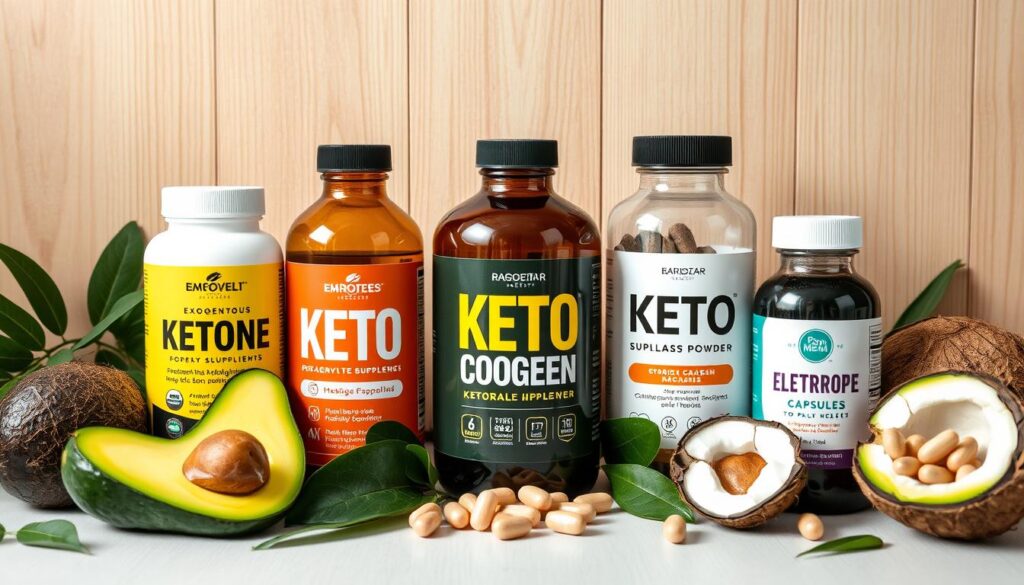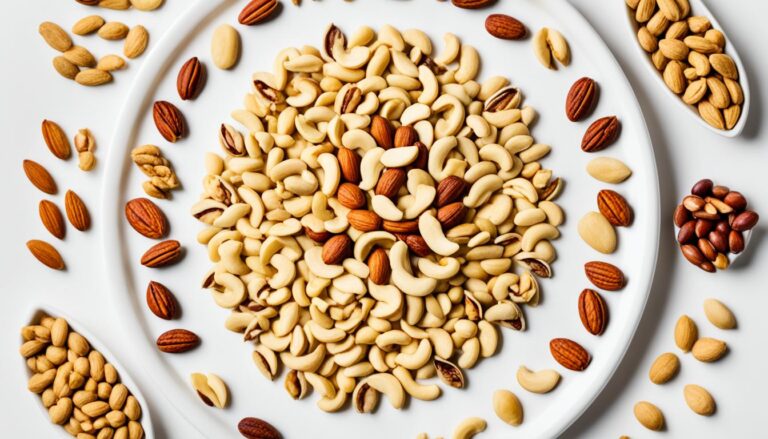Thinking about the ketogenic diet but not sure about supplements? The keto world can seem overwhelming. But with the right info, you can make the most of this low carb lifestyle.
This guide will show you the best supplements for a better keto experience and reaching your health goals.
Key Takeaways:
- Keto supplements can help prevent nutrient deficiencies, ease side effects, and enhance the diet’s effectiveness.
- Crucial supplements for keto success include MCT oil, magnesium, electrolytes, omega-3s, and fiber.
- Balancing macronutrients and ensuring adequate micronutrient intake is essential for maintaining ketosis and overall health.
- Proper supplementation can support weight loss, improve energy levels, and provide other health benefits on a keto diet.
- Consulting with a healthcare professional can help you determine the right supplement plan for your individual needs.
Understanding the Ketogenic Diet Basics
The ketogenic diet or keto is a diet high in fat and low in carbs. It has become very popular lately. The diet works by making your body burn fat instead of carbs for energy.
What is Ketosis and How Does it Work?
To enter ketosis, you need to eat less than 50 grams of carbs a day. This makes your body use fat for energy creating ketones. The keto diet is 70% fat, 20% protein, and 10% carbs.
The Role of Supplements in Keto
The keto diet can be tough especially because it might not give you all the nutrients you need. Supplements like electrolytes fiber, and vitamins can help. They support your body as it gets used to burning fat for energy.
Key Nutrient Considerations
- Magnesium Important for energy and can help with muscle cramps or constipation.
- Calcium Good for bones and might lower the risk of osteoporosis on the keto diet.
- Vitamin D Essential for the immune system and can be hard to get enough of on keto.
- Fiber Helps with digestion and can be hard to get enough of on a low-carb diet.
| Nutrient | Importance on Keto | Potential Deficiency Risks | Recommended Supplementation |
|---|---|---|---|
| Magnesium | Supports energy production and muscle function | Muscle cramps constipation | 200-400 mg per day |
| Calcium | Promotes bone health | Increased risk of osteoporosis | 1,000-1,200 mg per day |
| Vitamin D | Enhances immune function | Deficiency can impair immune system | 2,000-5,000 IU per day |
| Fiber | Supports digestive health | Constipation, irregularity | 25-30 grams per day |
Knowing the basics of the ketogenic diet and the importance of nutrients helps you navigate the keto lifestyle. It ensures your body gets the support it needs.
Essential Supplements for Keto Success
Keeping a ketogenic lifestyle means watching your nutrition closely. The lchf diet is great for health, but supplements help with energy side effects, and nutrients. Here are the key supplements for keto success.
Electrolytes Balancing the Keto Equation
Electrolytes like sodium, potassium, and magnesium are key for staying in ketogenic mode. When starting keto you might lose electrolytes causing tiredness, muscle cramps, and headaches. Aim for 1,500-2,300 mg of sodium, 400 mg of magnesium, and 2,000 mg of potassium daily.
Omega-3 Fatty Acids Supporting Heart and Brain Health
Omega-3 fatty acids found in fish oil offer extra benefits for keto dieters. Studies show they reduce inflammation improve insulin use, and boost brain function.
Fiber and Digestive Enzymes: Promoting Gut Health
The keto diet focuses on fats and low carbs, but fiber is key for digestion. Fiber and digestive enzymes help with nutrient absorption and prevent constipation a common ketogenic diet side effect.
Vitamins and Minerals Filling the Nutritional Gaps
The keto diet might lead to vitamin and mineral deficiencies like folate vitamin D, and magnesium. Supplements like methylfolate vitamin D3, and magnesium can fill these gaps and support your ketogenic lifestyle.

Always talk to a healthcare professional before starting supplements, especially with a ketogenic diet. The right supplements can help you get the most out of the lchf lifestyle and reach your health and fitness goals.
MCT Oil The Keto Friendly Energy Booster
On your keto or weight loss journey, you might have heard about MCT oil. This special fat can help you reach your health and fitness goals.
Benefits of MCT Oil Supplementation
MCT oil has fewer calories than regular fats, making it a better energy source. It can help you eat fewer calories which aids in weight loss. Research shows it can reduce body weight body fat, and waist size.
MCT oil might also boost your brain power. It could help people with Alzheimer’s disease especially those with a certain gene. It might also help kids with autism.
Recommended Dosage and Usage
Start with 1 teaspoon of MCT oil a day. You can add it to smoothies salad dressings or drink it straight. Begin with a small amount to avoid stomach upset.
Potential Side Effects
MCT oil is usually safe but can cause side effects in large amounts. You might feel bloated, have diarrhea, or stomach pain. Start with a small dose and slowly increase it.
Adding MCT oil to your keto or weight loss journey can be good. Knowing the benefits, how much to take, and possible side effects helps you use it wisely.
Magnesium A Critical Mineral for Keto Dieters
For those on a low carb or keto lifestyle, getting enough magnesium is key. Magnesium helps with over 350 body functions including energy muscle, and nerve health, and insulin control.
People on a keto diet might lose magnesium, leading to muscle cramps fatigue, and poor blood sugar control. These are signs of magnesium deficiency. To avoid these, taking supplements is often advised.
The daily magnesium need is 420 mg for men and 320 mg for women. Foods like pumpkin seeds leafy greens nuts salmon, and avocados are good sources. But, supplements are often needed for a low carb or keto diet.
| Form of Magnesium | Absorption Rate | Recommended Dosage |
|---|---|---|
| Magnesium Glycinate | High | 100-400 mg per day |
| Magnesium Citrate | High | 100-400 mg per day |
| Magnesium Oxide | Low | Not recommended |
Choose magnesium supplements like magnesium glycinate or magnesium citrate. They are easily absorbed and help prevent deficiency. They also help with constipation and support health for those on a keto lifestyle.

Read more: Magnesium deficiency back pain and scleroderma
Magnesium is involved in over 350 enzymatic reactions in the body emphasizing its importance for energy production muscle and nerve function DNA and RNA synthesis and insulin regulation.
Electrolyte Supplements on Keto
Keeping the right balance of electrolytes is key when you’re on a ketogenic or LCHF diet. Electrolyte problems often happen when you first start keto because you lose more water. Signs of not having enough electrolytes include feeling tired, having headaches, and muscle cramps.
Sodium and Potassium Balance
Sodium and potassium are very important for keeping fluids balanced muscles working right, and nerves sending signals. People on a ketogenic diet might need more sodium than others to stay healthy.
Signs of Electrolyte Imbalance
- Fatigue
- Headaches
- Muscle cramps
- Dizziness
- Insomnia
- Digestive issues
- Changes in blood pressure
Supplementation Guidelines
Adding sodium, potassium, and magnesium through supplements can help keep electrolyte levels right on a ketogenic diet. You can also get more electrolytes by adding salt to your food or drinking bone broth. It’s important to watch how you feel and change your supplements as needed to keep your electrolytes balanced.
Electrolyte replenishment is essential for individuals on a keto diet, and while symptoms like cramping and dizziness can indicate an imbalance regular monitoring and supplementation are recommended.
Omega-3 Fatty Acids and Keto Diet
Following a keto diet offers many benefits. But, it’s key to make sure you get all the nutrients you need. Omega-3 fatty acids are a must for your weight loss journey.
Omega-3s fight inflammation and are great for those on a keto diet. People on a keto diet might struggle to keep a healthy omega-3 to omega-6 ratio. This ratio is vital for health.
Fatty fish like salmon mackerel, and sardines are good sources of omega-3s. Grass-fed meats and eggs from pasture raised hens are also good. If you don’t get enough from food, an omega-3 supplement can help.
| Omega-3 Fatty Acid | Benefits for Keto Dieters | Recommended Dosage |
|---|---|---|
| EPA Eicosapentaenoic Acid | Reduces inflammation, supports heart health | 1,000-2,000 mg per day |
| DHA Docosahexaenoic Acid | Supports brain function, reduces triglycerides | 1,000-2,000 mg per day |
Always follow the instructions on your omega-3 supplement. Taking it with a meal that has healthy fats can help your body use it better.
Omega-3 fatty acids are a crucial component of a keto diet, providing numerous health benefits and supporting the body’s transition into a state of nutritional ketosis.
Adding omega-3 rich foods and supplements to your keto lifestyle can boost your health. It also helps with your weight loss journey.
Fiber Supplements Managing Digestive Health
Keeping your digestive system healthy is key when you’re on a low carb or keto lifestyle. The keto diet focuses on fats moderate protein, and low carbs. But, it might not give you enough fiber.
Fiber is important for your gut health, and it’s often found in foods like fruits veggies, and whole grains. These are foods you might not eat as much on a keto diet.
Luckily, fiber supplements can fill this gap. They help keep your digestive system running smoothly.
Types of Keto-Friendly Fiber Supplements
There are a few keto-friendly fiber supplements you can choose from:
- Psyllium husk – A soluble fiber that helps with regular bowel movements and blood sugar control.
- Ground flaxseed – It has both soluble and insoluble fiber, plus omega-3 fatty acids.
- Chia seeds – Rich in soluble fiber, protein, healthy fats, and minerals.
- Glucomannan – A water-soluble fiber that can help you feel full and manage weight.
Proper Dosage and Timing
When adding fiber supplements to your keto lifestyle, start with small amounts. Gradually increase as needed. Adults should aim for 25-38 grams of fiber daily. Most supplements offer 10-18 grams per serving.
Take your supplements with lots of water. Spread out your doses throughout the day to avoid stomach issues.
Fiber supplements are great for a low carb or keto diet. But, don’t forget to eat fiber-rich foods too. A mix of supplements and whole foods is best for your gut health and overall health on the keto path.
Vitamin D and Calcium Building Blocks for Success
For those on a ketogenic or lchf diet, keeping vitamin D and calcium levels right is key. Vitamin D helps your body absorb calcium. Without enough, you can only take in 10-15% of calcium from food. This can cause deficiencies and harm your bones.
There are keto-friendly foods rich in vitamin D, like salmon and mackerel. But many find it hard to get enough from food alone. That’s why supplements are a big help in the ketogenic lifestyle.
Adults on a ketogenic or lchf diet should aim for 600 IU of vitamin D and 1,000-1,200 mg of calcium daily. Always talk to a healthcare provider to find the right amount and timing for you. They’ll consider your specific needs and lab results.
Maintaining adequate vitamin D and calcium levels is crucial for preserving bone health and overall wellbeing on a ketogenic diet.
Adding these important nutrients to your ketogenic or lchf diet helps your body thrive. It supports your health and fitness goals.

Digestive Enzymes and L-Theanine Support
Starting your keto journey? It’s important to focus on digestive health and mental well-being. Supplements like digestive enzymes and L-theanine can offer great support.
Benefits for Keto Adaptation
Digestive enzymes can ease digestive issues that come with a high fat low carb diet. Look for supplements with lipase, an enzyme that breaks down fats. This can improve nutrient absorption and lessen symptoms like bloating and constipation.
L-theanine, an amino acid from green tea can also help. It may improve sleep and reduce anxiety during the keto adaptation phase. This is especially helpful for those feeling mentally foggy or struggling to focus.
When and How to Take These Supplements
For the best results follow these guidelines:
- Digestive enzymes Take with meals to help break down fats, proteins, and carbs.
- L-theanine Take 100-400 mg daily either as needed or before bed to help relax and sleep better.
Adding these supplements to your keto plan can aid your body’s adaptation. It can also boost your weight loss journey. Always talk to a healthcare professional to find the right supplements for you.
Keto and Supplements What You Need to Know
The ketogenic, or keto lifestyle is a diet that’s low in carbs and high in fat. It helps burn fat and lose weight. A well-planned keto diet is complete, but supplements can help fill gaps and ease the transition.
Some essential supplements for the keto lifestyle include:
- MCT Oil: Provides a concentrated source of fatty acids that can support energy levels and ketosis.
- Magnesium: Crucial for muscle function and energy metabolism, which can be depleted on a low-carb diet.
- Electrolytes: Sodium, potassium, and magnesium help maintain fluid balance and prevent keto flu symptoms.
- Omega-3 Fatty Acids: Support heart health and reduce inflammation, which can be beneficial for keto dieters.
- Fiber Supplements: Help maintain digestive health and regularity, which can be challenging on a low-carb diet.
- Vitamin D and Calcium: Important for bone health, especially when dietary sources are limited.
- Digestive Enzymes: Can aid in the breakdown and absorption of nutrients on a high-fat, low-carb diet.
Before starting any new supplement, it’s important to talk to a healthcare provider. This is especially true if you have health conditions. Using supplements responsibly along with a well-formulated keto diet can support your health and wellness.

Read more: Lasting Weight Loss with Mediterranean Diet
| Supplement | Benefits for Keto Dieters | Recommended Dosage |
|---|---|---|
| MCT Oil | Provides a concentrated source of fatty acids, which can support energy levels and ketosis. | Start with 1-2 tablespoons per day and gradually increase as tolerated. |
| Magnesium | Crucial for muscle function and energy metabolism, which can be depleted on a low-carb diet. | 300-400 mg per day, split into smaller doses. |
| Electrolytes | Sodium, potassium, and magnesium help maintain fluid balance and prevent keto flu symptoms. | Adjust intake based on individual needs and symptoms, typically 3,000-5,000 mg of sodium and 1,000-3,000 mg of potassium per day. |
Remember, the keto lifestyle requires careful planning and monitoring. Always consult with a healthcare professional before making significant dietary changes or starting new supplements.
Conclusion
The ketogenic diet is getting more attention for weight loss and health management. Supplements help meet nutritional needs and boost the diet’s effectiveness. But it’s key to be careful with supplements, considering personal needs and possible interactions.
We’ve looked at the basics of the ketogenic diet and the role of supplements. We’ve also talked about the good and bad sides of this diet. Regular check-ups with healthcare providers are crucial for a safe and successful keto diet and supplement plan.
The ketogenic diet might show quick results, but long-term use can be tough and risky. Experts often suggest the Mediterranean diet for lasting weight loss and health. By knowing the ketogenic diet well and using supplements wisely people can enjoy its benefits while avoiding risks.





